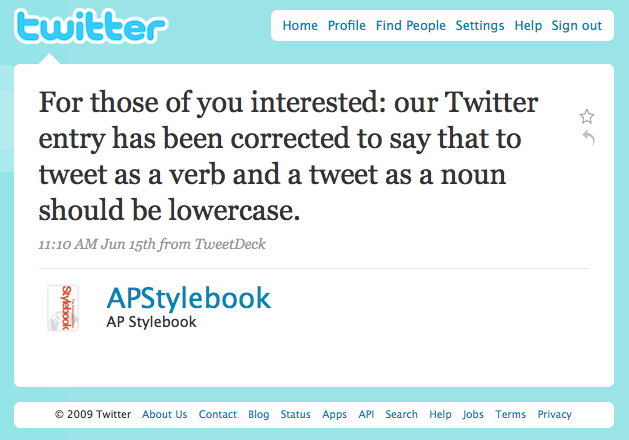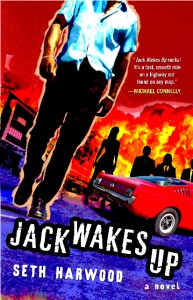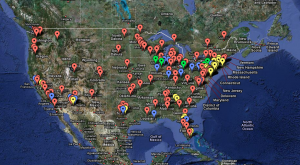Hi, I’m Mignon Fogarty and this is Behind the Grammar, the podcast where I talk about language, marketing, social networking, interview interesting people, and talk about whatever else strikes my fancy. This show is not scripted, so I be warned…I may misspeak. Today I’m talking about ghost-writers for novels, how JD Salinger is trying to block the publication of a sequel to Catcher in the Rye, an update about the word “tweet” being capitalized, some struggles I have with the Grammar Girl podcast, my friend Scott Sigler’s new novel, and why it’s difficult to start a podcast.
If you’re buying stuff at GoDaddy–say a domain name or hosting–and you’d like to get 10% off while supporting this podcast, use the code POD115 when you check out. That’s POD115 for a 10% discount.
WRITE YOUR OWN DARN NOVEL!
Last week I met a fascinating, 94-year-old man who I’m profiling for my homeowners’ association newsletter.
Like a few other people I’ve met, Ralph has an idea for a novel and wants ME to write it for him. First, I don’t write novels. I write non-fiction and there’s a big difference. Ralph hears I’m a writer, and even though I explain what I do–I write about grammar–he insists that I should write novels, and then tells me his idea, which admittedly, is actually pretty brilliant.
Second, is there anyone out there who actually ghost-writes novels for people, or even co-writes them? I’ve heard of people ghost-writing celebrity biographies or even regular non-fiction, but despite the fact that people often ask me about how they can find a ghost-writer for their fiction idea, I’ve never actually heard of writers doing that. I imagine that writing a novel is even harder work than writing non-fiction, and it’s all about wanting to share YOUR creativity with the world. If someone is willing to work hard enough to write a novel, they’re going to have their own idea for one.
So I said to Ralph, “Write it yourself!” But he doesn’t think he can. English isn’t his first language, and although he speaks as well as most people I know, he doesn’t think his grasp of the language is good enough to write his novel. I think he should try.
And third, why does there seem to be this weird bias that you’re not a real writer unless you’re writing fiction. This isn’t the first time I’ve gotten the you’ve-written-a-best-selling-non-fiction-book-now-when-are-you-going-to-write-a-novel response. I might give it a try someday, but aside from the ability to complete a long writing project, I don’t think the necessary skills for good fiction and non-fiction overlap that much.
I’m curious what you think. Has anyone else run into this weird fiction-is-better idea, or do you know anyone who ghost-writes fiction? Would you ghost-write fiction? Let me know. Leave a comment on the blog.
(And yes, I know there about 100 more profitable things I could be doing with my time than writing an HOA newsletter, but I love my building and want to make it a more lively, friendly place to live. I figure if a NYT best-selling author steps up and volunteers to do something, maybe it will shame some of the people with ten times more time on their hands to actually contribute. And yes, I know I’m delusional.)
SALINGER INJUNCTION
There was big news in the publishing world this week. After J.D. Salinger’s huge success with Catcher in the Rye, he apparently found he didn’t like all the attention and became a recluse. He’s known for not giving interviews, and he eventually stopped publishing his work. (I wonder if he stopped writing, or just stopped publishing, but that’s a different topic.) Catcher in the Rye was published in 1951 and according to Wikipedia, Salinger hasn’t published an original work since 1965.
Now, a Swedish author named Fredrik Colting has written a book called 60 Years Later: Coming Through the Rye that features the main character from Catcher in the Rye, Holden Caufield, as an old man.
Salinger is suing to stop the publication of this unauthorized sequel, and last week a Second Circuit judge temporarily barred the publication of the novel, essentially saying for the first time that it’s possible to copyright a character from a single work, and she is expected to rule soon on whether Colting’s use of the character could constitute fair use. An excellent article in Publishers Weekly has more details and ends with this statement, which I find fascinating:
“Attorneys for Salinger argued forcefully … for the author’s right “not to publish… [Salinger has a right] to keep The Catcher in the Rye or Holden Caulfield frozen in time for the life of his copyright.” I’ll put a link to the whole Publishers Weekly article at behindthegrammar.com: http://cli.gs/0S9qJR
The legal system will determine what happens, but I can’t seem to decide how I feel about the case. One the one hand, I can see Salinger’s right to control a character of his own invention–Holden Caufield–but on the other hand, it seems heavy handed to not allow derivative works. It makes me think of Mysts of Avalon, which tells the story of King Arthur from the point of view of the female characters, Wicked, which tells the story of The Wizard of Oz from the point of view of the Wicked Witch of the West, and Grendel which does the same thing with a character from Beowulf. Are those books allowed simply because the stories are so old they’re out of copyright, or because nobody cared enough to sue over it? I’d hate to see that genre go away, but I still find myself feeling sympathetic to Salinger, and it seem as if there is something different about taking a minor character and writing a book around them versus essentially writing a sequel.
That makes me think of the book Scarlett, which is a sequel to Gone with the Wind, and as I started reading about it, that turned into an interesting and similar story. The author, Margaret Mitchell, is said to have refused to write a sequel, and after she died her brother became the owner of the copyright in something called the Stephen Mitchell Trusts. He refused to allow any sequels to be made to the book or the film, but apparently after HE died in 1991, whoever gained control of the estate allowed a sequel to be written.
Between 1991 and 2007 when the Scarlett book came out, the trust twice sued at least two times to prevent the publication of other sequels or derivative works. In 2000, the courts blocked the publication of a book called The Winds Done Gone, which tells the original story from the point of view of the slaves; but another court appears to have overturned that decision, and the book was ultimately published after the parties reached a settlement in which the publisher, Houghton Mifflin, apparently agreed to make a donation from the proceeds to Morehouse College, one of the historically African-American colleges in Atlanta to which the Mitchell family has long-standing ties.
Then, in 2002 the trust successfully blocked the publication of a book that was a direct sequel to Gone with the Wind. It was called The Winds of Tara and much like the Catcher in the Rye sequel, it follows the main character, Scarlett, after the end of the original book. I’m not certain, but it sounds as if that never went to trial, but instead the author or publisher just caved after being initially sued or threatened with a suit.
And, then I came across a similar case in which an Italian author named Pia Para tried to publish a sequel to Nabokov’s Lolita titled Lo’s Diary and Nabokov’s son tried to block publication. Those parties also settled and the book was published. So it seems this isn’t an uncommon problem.
Interestingly, although I tend to sympathize with the original authors, my husband is in favor of allowing people to publish sequels if the author doesn’t. He comes from a biotech background and has been awarded a few patents, and his rationale come from that experience. He says if you file a patent, you’re required to show that you’re working toward commercializing the product, and if you don’t, you can lose your patent. That the purpose of patent protection is to encourage commercialization, so he sees copyright the same way. The government is giving creators rights so that they will do something for the greater good with those rights. It should give the holders the right to exclusively “commercialize” their ideas, but if they fail to commercialize them or refuse to commercialize them essentially by refusing to write more books, he thinks they should lose that protection after some reasonable amount of time, say 10 or 20 years.
I disagree. I see a creative work like a novel or character as different from something like a heart valve, but I can’t exactly say why. With the heart valve idea you can make the argument that it’s in the public’s interest to have the product developed and if the patent holder isn’t going to, then someone else should be able to, and that’s different from a creative work. It’s not necessarily in the public interest to have a sequel to Gone with the Wind or Catcher in the Rye, but all kinds of things are patented that aren’t as useful as heart valves, so that argument kind of breaks down when you’re talking about the bendy straw or something like that. The public good from commercializing the bendy straw seems no greater or even less than that from a book sequel.
Anyway, it’s interesting stuff and I’ll be curious to see what happens with the Salinger case. Unlike the other cases I found, nobody seems to have the impression that Salinger is open to settling and since Catcher in the Rye supposedly still sells about 250,000 copies per year, he probably has the resources to fight it for a good, long time
UPDATE: AP SAYS “TWEET” IS LOWERCASE
Next, if you listened last week, you know that I commented that I thought it was weird that the Associated Press said the word “tweet” should be capitalized when it’s used as a verb. Well, they changed their mind! I’d love to say they heard my show and were swayed by my elegant argument, but it turns out it was just an error that slipped through their editing process. So, if you are writing that you posted a tweet, “tweet” is lowercase because it’s not derived from the company name.

WHAT TO DO?
Next. I’m having some struggles with the Grammar Girl podcast. I’m discouraged this week because the transcript was posted with a punctuation error and a typo. I rushed it out because I was waiting for a quote from the AP, so it was already a day late, but the bigger problem is that I spend hours every day answering grammar questions online and then I end up rushing my show out EVERY week.
I started the free daily e-mail newsletter with a grammar tip so I could answer one question every day and help more people by getting it to lots of people instead of answering lots of individual e-mails or messages on Twitter or Facebook. But it’s backfired because now I’m committed to writing that one tip every day AND the e-mail newsletter has caused many more people to send me questions. I don’t know what to do.
The logical answer is that I should stop answering so many individual questions, but that doesn’t feel right either. I can’t relax; these questions just hang over my head until I answer them. I see that people need help and I have to help them. The only way I’ve ever been able to get out from under it is when I don’t see the questions. I already have an assistant who intercepts some of my messages, but these days there are too many different ways for people to reach me. I don’t know what to do, but what I’m doing doesn’t seem sustainable.
I probably shouldn’t have started this podcast–it’s one more thing to do–but I really wanted to. I wanted to talk about all this interesting stuff I come across every week. What I need to do is resist the temptation to post a transcript like I do with Grammar Girl. That’s what takes so much time. If I hadn’t posted the transcript to the Grammar Girl podcast there wouldn’t have been punctuation errors to see, and there wouldn’t be typos to see. Having the script there helped grow that show, but I don’t need to grow this show. This is my fun show; this is my just-be-me-laid-back show. So in the future–no script. I shouldn’t have to have a script to laid back and be me anyway! I’m completely dependent on having a script, and that seems bad. I guess it really means I’m a writer at heart, but still. No script.
$3 OFF “THE ROOKIE”
Next, my friend Scott Sigler has given me a discount code so you can get $3 off his new book, “The Rookie.” The story is set in a lethal pro football league 700 years in the future. Scott says it combines the intense gridiron action of “Any Given Sunday” with the space opera style of “Star Wars” and the criminal underworld of “The Godfather.” In it, aliens and humans play positions based on physiology, creating receivers that jump 25 feet into the air, linemen that bench-press 1,200 pounds, and linebackers that literally want to eat you. Organized crime runs every franchise, games are fixed and rival players are assassinated. The story of “The Rookie” follows Quentin Barnes, a 19-year-old quarterback prodigy who’s been raised all his life to hate, and kill, those aliens. He has to deal with his racism and learn to lead, or he’ll wind up just another stat in the column marked “killed on the field.”
So, go to scottsigler.com/therookie to get a signed, limited-edition copy of “The Rookie” from Scott Sigler. Only 3000 copies of this book have been printed. They have an embossed, hard cover with eight color plates inside. Scott’s last book was a New York Times bestseller, so these limited edition books are a neat deal, and you can get $3 off with code “grammar.” So again, that’s scottsigler.com/therookie, and then use the code “grammar.” I’ll have all that info on the Behind the Grammar website too.
IT’S HARD TO LAUNCH A PODCAST
Finally, For the time being and for the most part, I’m intentionally not using my existing networks to get the word out about this podcast. It’s essentially my hobby and a side project, and it’s not part of the Quick and Dirty Tips network, so I feel a little weird about using Grammar Girl or QDT to promote it, and it’s not really necessary because getting a big audience isn’t one of my top priorities for the show. Sort of.
But the experience has reminded me how difficult it is to launch a new podcast all by yourself. When we launch a new Quick and Dirty Tips show, it immediately has five to ten times the traffic I’ve been getting for this show. And, I think like most podcasters, there’s a part of me that is obsessed with stats, so although I say I don’t care about the traffic, I still find myself checking the stats and the iTunes rank at least a few times a day. My husband kids me that I’m not capable of having a hobby; that I turn every hobby I’ve ever had into a job. I’m fighting it, but I can also feel the lure of wanting to be successful. So with that said, if you enjoy the show, please leave a review at iTunes.
And remember the GoDaddy code if you need a domain name or website hosting. It will get you 10% off and throw me some change: POD115.
That’s all. Thanks for listening.


































